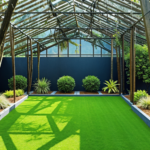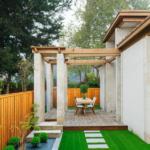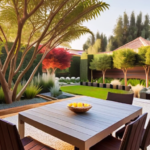Plants with red leaves add dramatic shades of maroon, crimson, burgundy, and deep pink to a home’s interior. And if red is your favorite color or the red color ties in nicely with the theme of your decor, an indoor plant with green and red leaves will suit you quite well.
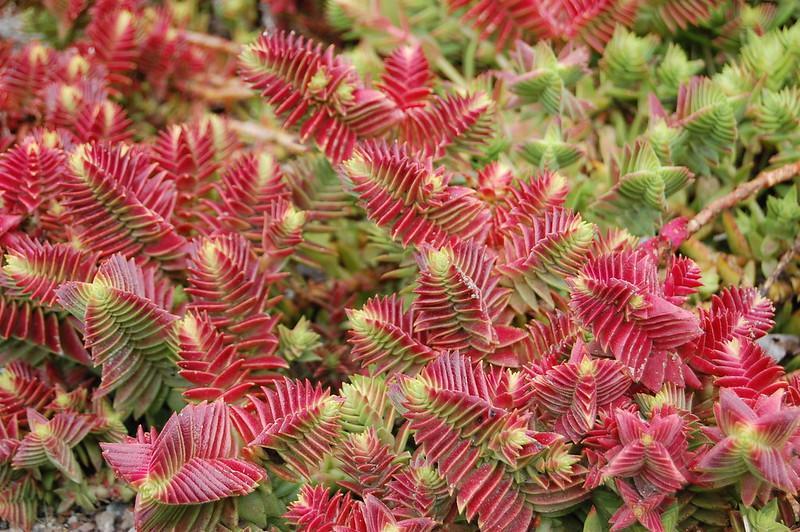
Photo Credit If you’re looking for a plant to tie in with your red decor, there are many plants with red & green leaves.
It might surprise you to discover the sheer diversity of red plants. They come with various variations in vibrancy, leaf pattern, and hues. All in all, you have plenty of options, and some plants with red and green leaves literally look like something out of a magical fairytale.
With so many options, picking the right plant with red and green leaves will ultimately come down to indoor location, ease of care, and the look you are going for.
Plants with bright red and green leaves add a touch of warmth to the décor and bring a sense of warmth and vibrancy to the space. Some good examples include Stromanthe, Coleus, Caladium, Anthurium, and Blushing Bromeliad.
And now, without further ado, onto our list of red and green houseplants!
Plants With Red And Green Leaves
1. Red Fountain Cordyline (Cordyline’ Red Fountain’)
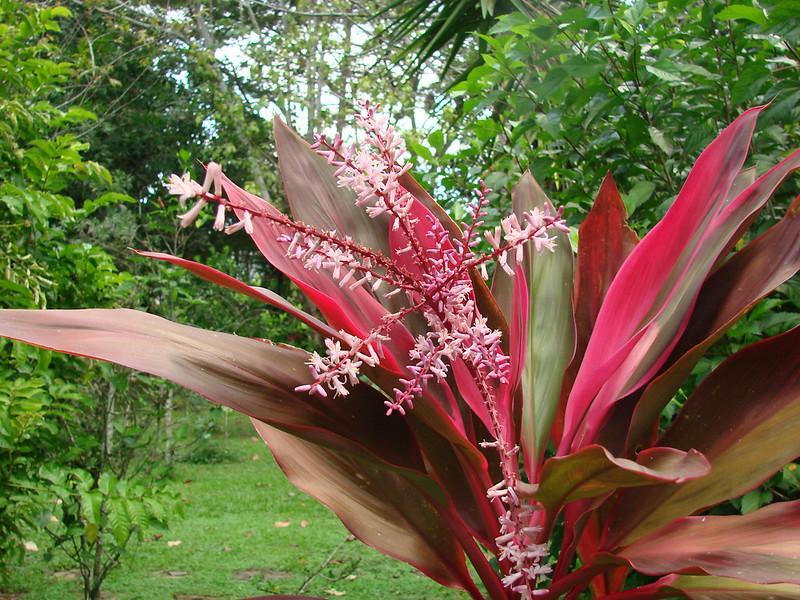
Photo Credit Cordyline Red Fountain has thin arching burgundy leaves that form a deep red, grassy look.
Quick Plant Information
| Plant Type | Perennial |
| Ideal USDA Zones | 9-11 |
| Season Of Interest | Year-round |
| Growth Rate | Moderate |
| Mature Height | 36-48 in (90-120 cm) |
| Mature Spread | 24-36 in (60-90 cm) |
| Pruning Needs | Minimal; remove old leaves as needed |
| Toxic? | Toxic to dogs and cats if ingested. |
| Landscape Use | Accent plants, container plants, tropical landscapes |
| Methods Of Propagation | Stem cuttings, division of clumps |
Plant Overview
A Red Fountain Cordyline plant in a container can make a strong architectural statement to your home’s decor. There’s a lot to love about Red Fountain Cordyline, which is stunning, colorful, and compact. It is an attractive palm-type plant with long, sword-shaped, arching red and green leaves. And they just don’t look and sit pretty! Cordylines produce scented flowers in summer, especially if they are placed outdoors in bright sunlight.
Where To Buy?
Three (3) CORDYLINE ‘RED SENSATION’ Starter Plants
2. Chinese Evergreen (Aglaonema commutatum)
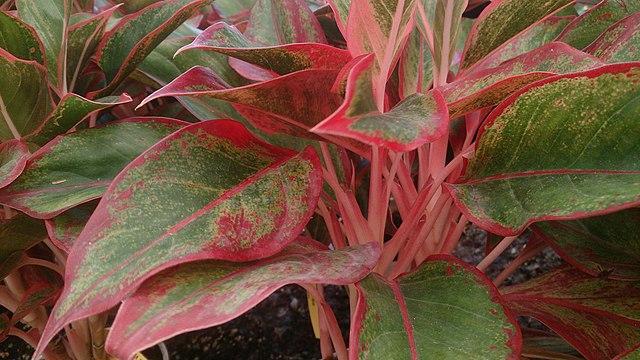
Photo Credit Chinese evergreens can brighten any room with their leaves of green, creamy white, and red.
Quick Plant Information
| Plant Type | Perennial |
| Ideal USDA Zones | 10-11 |
| Season Of Interest | Year-round |
| Growth Rate | Slow |
| Mature Height | 12-36 in (30-90 cm) |
| Mature Spread | 12-36 in (30-90 cm) |
| Pruning Needs | Minimal; remove old leaves as needed |
| Toxic? | Toxic to pets and humans if ingested |
| Landscape Use | Houseplants, office plants, tropical landscapes |
| Methods Of Propagation | Stem cuttings, division of clumps |
Plant Overview
Chinese evergreens have been used as ornamental plants worldwide for centuries, and plant enthusiasts have developed many stunning variations of them. It’s easy to grow, tolerates low light levels, and with its large leaves, the Chinese evergreen plant can bring lush, tropical elegance to any interior. The plant also sometimes blooms with Peace Lilly-like flowers. However, the flowers are not very showy and don’t smell as good.
Where To Buy?
Aglaonema Red Chinese Evergreen Houseplant rooted plant
3. Red Air Plant (Tillandsia abdita)
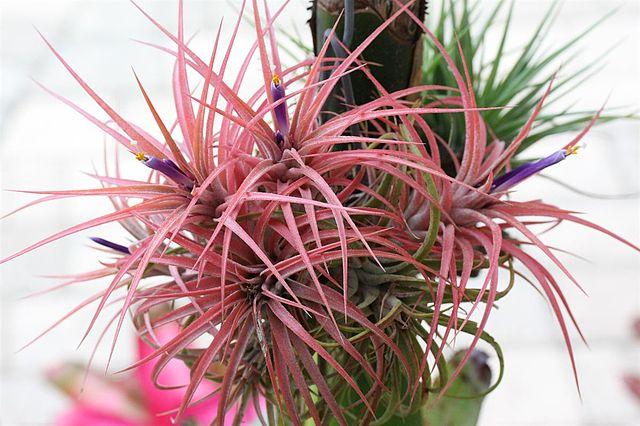
Photo Credit A small, dependable air plant with spiky foliage with bright red, green, and orange tones.
Quick Plant Information
| Plant Type | Perennial |
| Ideal USDA Zones | 10-11 |
| Season Of Interest | Year-round |
| Growth Rate | Slow |
| Mature Height | 4-6 in (10-15 cm) |
| Mature Spread | 4-6 in (10-15 cm) |
| Pruning Needs | Minimal; remove old leaves as needed |
| Toxic? | Non-toxic |
| Landscape Use | Hanging baskets, terrariums, living walls |
| Methods Of Propagation | Pups, seeds, division of clumps |
Plant Overview
Air Plants are some of the easiest to care for as they do not need soil to grow. Just give them a bit of water mixed with some nutrients and light to survive, and you are good to go. These rootless wonders allow many creative possibilities to decorate your home.
However, there are a few general rules regarding air plant care. They have specific watering needs, are sensitive to light, and do not like changing indoor temperatures.
Where To Buy?
5 Red Air Plants – Red Abdita Air Plant – Set of 5 Tillandsia
4. Red-Edged Dracaena (Dracaena Marginata ‘Red-Edge’)
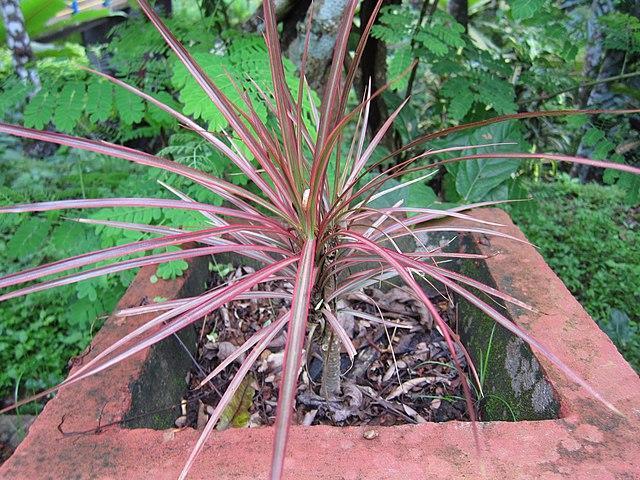
Photo Credit This fantastic natural air purifier is on NASA’s top 10 air cleaning plants list.
Quick Plant Information
| Plant Type | Perennial |
| Ideal USDA Zones | 10-12 |
| Season Of Interest | Year-round |
| Growth Rate | Slow |
| Mature Height | 6-15 ft (1.8-4.5 m) |
| Mature Spread | 2-3 ft (0.6-0.9 m) |
| Pruning Needs | Minimal; remove old leaves as needed |
| Toxic? | Toxic to pets and humans if ingested |
| Landscape Use | Houseplants, office plants, tropical landscapes |
| Methods Of Propagation | Stem cuttings, division of clumps |
Plant Overview
Also known as the Madagascar Dragon Tree, the plant has long, thin, arching green leaves that are edged in a dark red. It has a great container plant that, over the years, has earned a rightful place in many tropical gardens and temperate climate homes. Its stems are often thick, twisted, and woody. The branches give rise to smaller stems, allowing the plant to spread in all directions. Furthermore, it is drought-tolerant, easy to care for, and nearly indestructible if given the proper care and growth conditions.
Where To Buy?
Dracaena Marginata ‘Red-Edge’ potted 2.25 gallons pot
5. Baby Rubber Plant (Peperomia rubella)
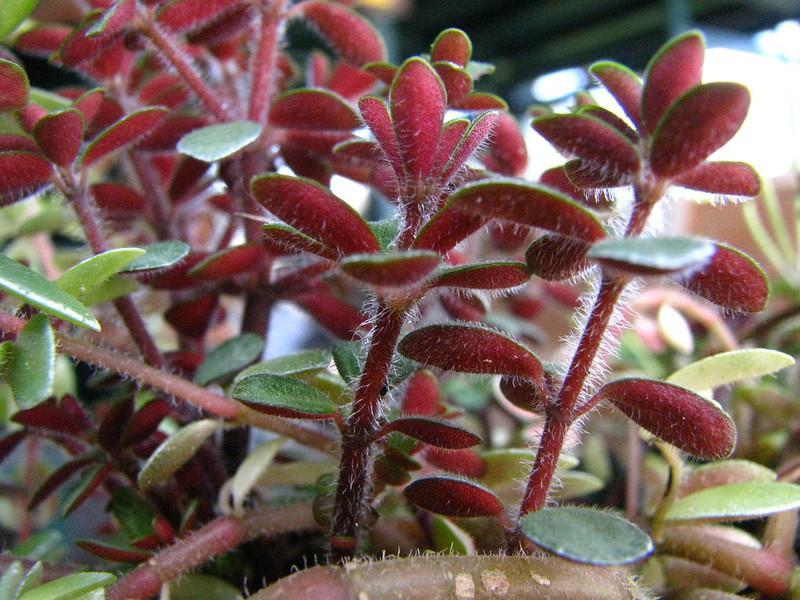
Photo Credit Meet National Garden Bureau 2022’s Houseplant of the Year, the baby rubber plant.
Quick Plant Information
| Plant Type | Perennial |
| Ideal USDA Zones | 10-12 |
| Season Of Interest | Year-round |
| Growth Rate | Slow |
| Mature Height | 6-12 in (15-30 cm) |
| Mature Spread | 6-12 in (15-30 cm) |
| Pruning Needs | Minimal; pinch back stem tips to encourage bushiness |
| Toxic? | Non-toxic |
| Landscape Use | Houseplant, terrarium plant, ground cover |
| Methods Of Propagation | Leaf cuttings, stem cuttings, division of clumps |
Plant Overview
If you’re looking for an indoor plant that’s easy to care for but does not compromise on looks, you have found it. It’s all about the foliage with the baby rubber plant. It has glossy leaves with petioles that grow close to the stem giving the plant an overall bushy appearance.
It is an easy-going tropical plant that adapts happily to standard indoor conditions. And its fleshy, thick stems and succulent leaves will happily tolerate some neglect.
Where To Buy?
6. Rainbow Coleus (Coleus’ Superfine Rainbow Colors Pride’)
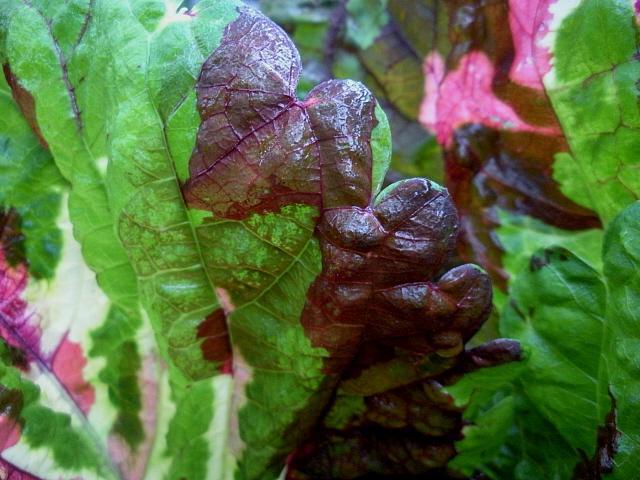
Photo Credit The plant is frequently grown for its velvety foliage in shades of red, yellow, green, and bronze.
Quick Plant Information
| Plant Type | Perennial |
| Ideal USDA Zones | 10-11 |
| Season Of Interest | Spring, summer, and fall |
| Growth Rate | Fast |
| Mature Height | 1-3 ft (30-90 cm) |
| Mature Spread | 1-3 ft (30-90 cm) |
| Pruning Needs | Regular pruning to encourage bushiness and shape |
| Toxic? | Toxic to pets and humans if ingested |
| Landscape Use | Annual bedding plant, container plant, landscape plant |
| Methods Of Propagation | Stem cuttings, seeds |
Plant Overview
Rainbow coleus has made a massive comeback in recent years as an indoor plant because of its lovely, bright foliage that offers months-long interest, whether planted in full sun or shade.
However, the intensity of the colors will vary depending on sunlight, the surrounding temperature, and other growing conditions. Aside from that, it is an excellent plant for adding color to homes, offices, and gardens, especially in those dark, drab-looking spots.
Where To Buy?
Coleus (seeds) Superfine Rainbow Multicolor, Vibrant Ornamental Plant
RELATED: 18 Easy Common Houseplants You Must Have In You Home
7. Polka Dot Plant (Hypoestes phyllostachya)
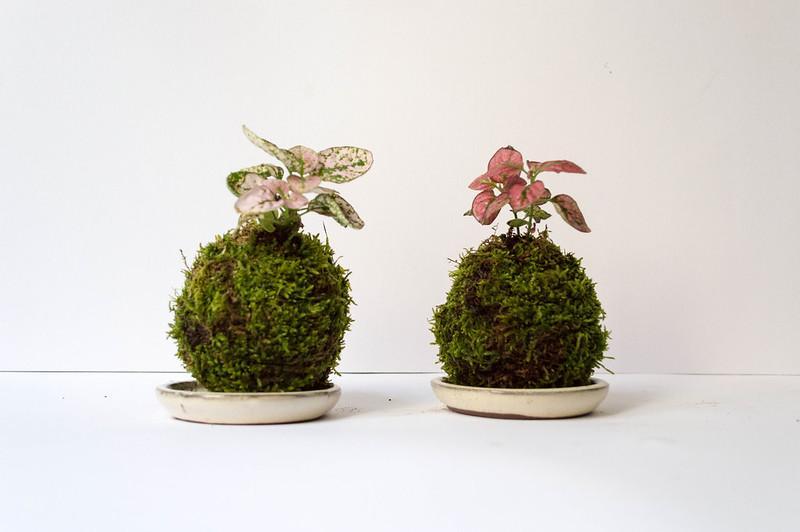
Photo Credit The Polka dot plant is a delicate tropical foliage plant with red, pink, and white leaves.
Quick Plant Information
| Plant Type | Perennial |
| Ideal USDA Zones | 10-11 |
| Season Of Interest | Year-round |
| Growth Rate | Moderate |
| Mature Height | 1-2 ft (30-60 cm) |
| Mature Spread | 1-2 ft (30-60 cm) |
| Pruning Needs | Pinch back stem tips to encourage bushiness |
| Toxic? | Non-toxic |
| Landscape Use | Houseplant, container plant, landscape plant |
| Methods Of Propagation | Stem cuttings, division of clumps |
Plant Overview
The polka dot plant is an eye-catching tropical with brightly variegated leaves marked with dark green splashes that stand out against most other foliage. Not only is it eye-catching, but it’s also easy to grow and is well worth adding to your indoor garden.
The plant produces its best color in low light conditions. However, it can grow in full sun too. Furthermore, Polka dot plant care is a breeze, and it is very beginner friendly.
Where To Buy?
Polka dot plant Hypoestes phyllostachya Pink Splash freckle face plant
8. Croton (Codiaeum variegatum)
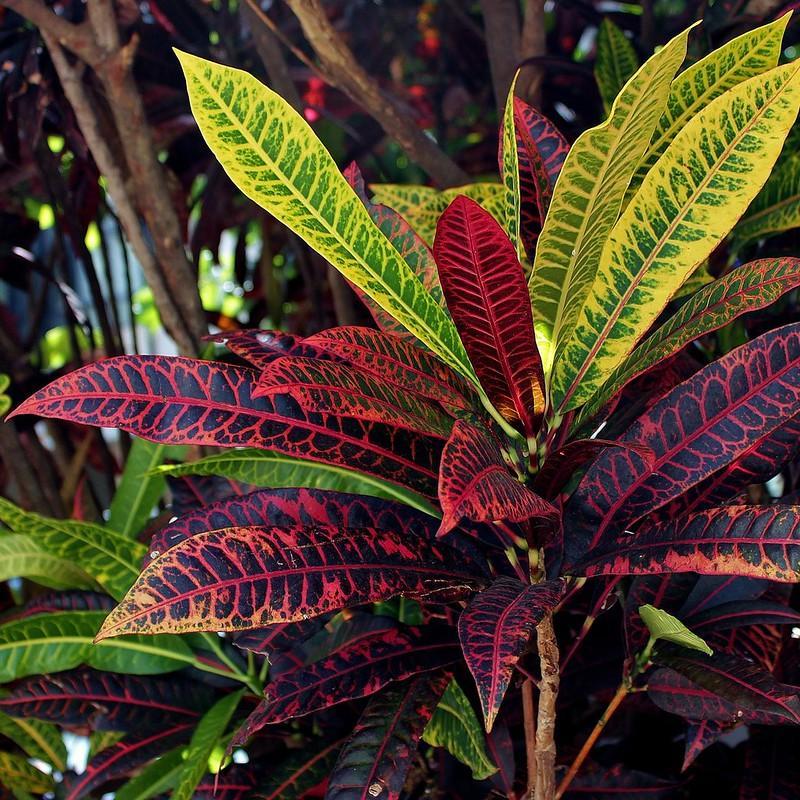
Photo Credit An easy-to-grow houseplant famed for its foliage covered in green, red, and scarlet splotches.
Quick Plant Information
| Plant Type | Perennial |
| Ideal USDA Zones | 10-11 |
| Season Of Interest | Year-round |
| Growth Rate | Moderate |
| Mature Height | 3-8 ft (90-240 cm) |
| Mature Spread | 3-6 ft (90-180 cm) |
| Pruning Needs | Regular pruning to maintain shape and size |
| Toxic? | Toxic to pets and humans if ingested. |
| Landscape Use | Houseplant, container plant, landscape plant |
| Methods Of Propagation | Stem cuttings |
Plant Overview
The croton plant has nearly limitless leaf forms and colorful variegated foliage. Its bright colors draw the eye like a moth to a flame. Outdoors the plant can reach around 8 feet tall, serving as an excellent focal point. However, you can also buy it as a pot-grown indoor plant that tends to be much smaller, making it a perfect indoor plant as well.
Also, when growing them, they need intense care when establishing. However, once developed, they are pretty low care and can even manage less than ideal conditions.
Where To Buy?
Codiaeum Variegatum, aka Joseph’s Coat or Croton
9. Red-Edge Peperomia (Peperomia clusiifolia)
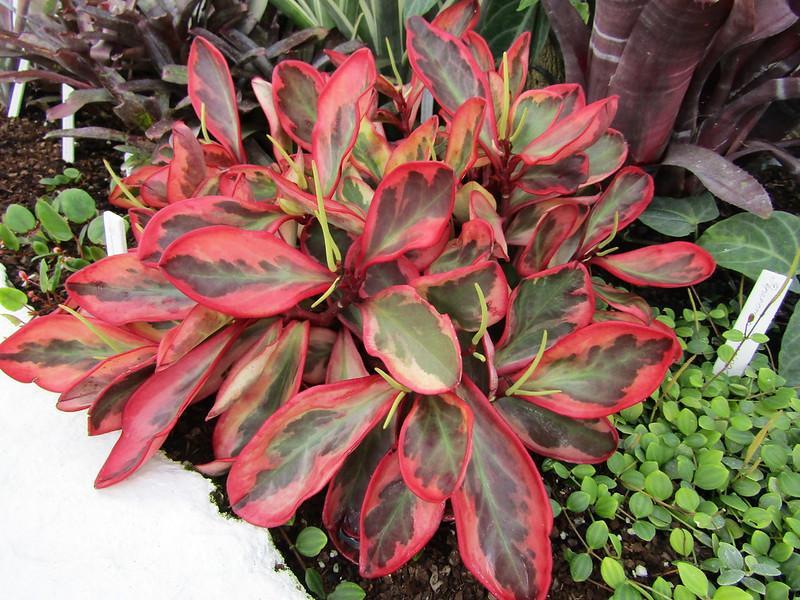
Photo Credit With its robust, round green leaves with red edges, Red Edge Peperomia is worth considering.
Quick Plant Information
| Plant Type | Perennial |
| Ideal USDA Zones | 10-11 |
| Season Of Interest | Year-round |
| Growth Rate | Slow |
| Mature Height | 1-2 ft (30-60 cm) |
| Mature Spread | 1-2 ft (30-60 cm) |
| Pruning Needs | Minimal; pinch back stem tips to encourage bushiness |
| Toxic? | Non-toxic |
| Landscape Use | Houseplant, container plant |
| Methods Of Propagation | Stem cuttings |
Plant Overview
You will admire this plant if you haven’t experienced much luck with flowering indoor plants. With Peperomia, it is all about leaves! The plant has thick, green, elongated oval-shaped leaves that are red or pink at the edges and are waxy. While mostly planted indoors, you can grow them outside in warm, tropical areas as a ground cover.
And it shows its most vibrant and bright colors when it receives sufficient sunlight. Also, it needs to be kept moist and performs best with light watering spread over time.
Where To Buy?
Peperomia Clusiifolia Red-edge Peperomia 4″
10. Red Veined Nerve Plant (Fittonia verschaffeltii)
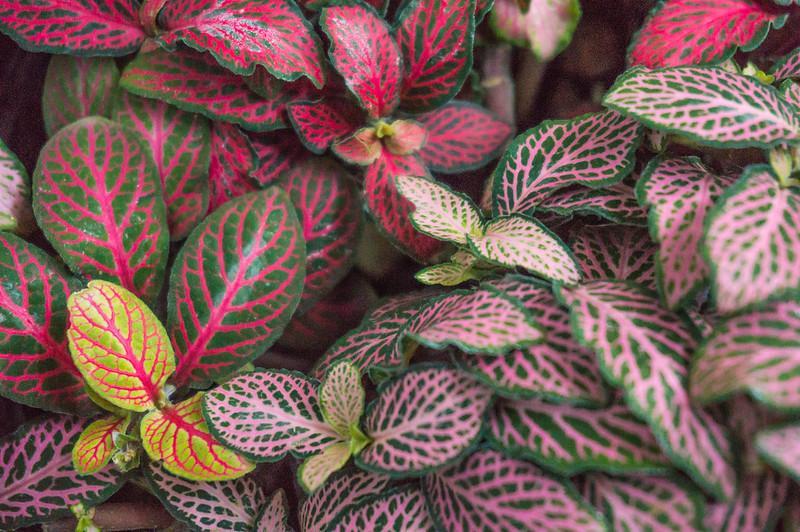
Photo Center A tropical plant known for its crispy green leaves with spindly red veins and colored nodes.
Quick Plant Information
| Plant Type | Perennial |
| Ideal USDA Zones | 10-11 |
| Season Of Interest | Year-round |
| Growth Rate | Moderate |
| Mature Height | 6-12 inches (15-30 cm) |
| Mature Spread | 6-12 inches (15-30 cm) |
| Pruning Needs | Minimal; pinch back stem tips to encourage bushiness |
| Toxic? | Non-toxic |
| Landscape Use | Houseplant, terrarium plant |
| Methods Of Propagation | Stem cuttings |
Plant Overview
Generally grown as a potted houseplant, the red nerve plant is a slow-growing plant that occasionally blooms with small reddish or yellowish-white spikes. However, as you might have guessed by the way it looks, it is usually plated for its leaves.
And in the right zone, the plant is sometimes used as a creeping ground cover.
Nevertheless, growing red nerve plants and their care is easy. Furthermore, their small size and catchy colors make them famous for terrariums and mixed gardens.
Where To Buy?
Red Veined Nerve Plant Fittonia – 6″ Pot
11. Angel Wings (Caladium’ Red Flash’)
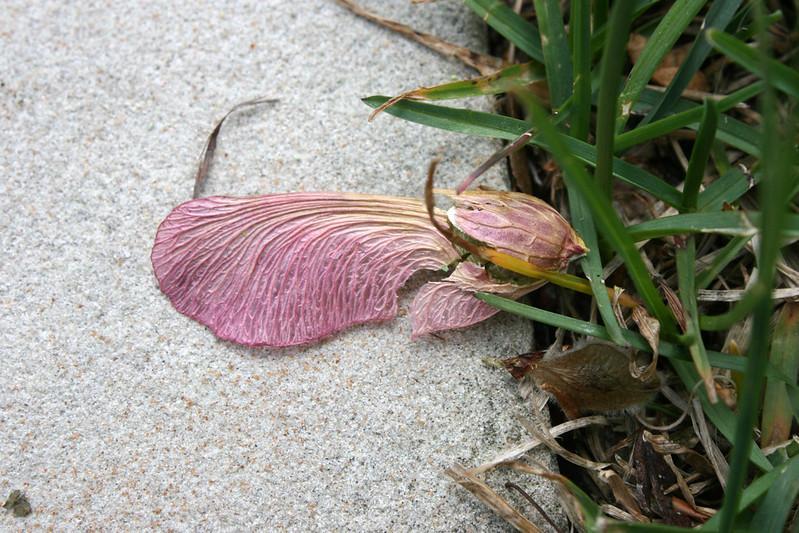
Photo Credit Angel Wings is an unusual and eye-catching plant with huge, fluffy red and green leaves.
Quick Plant Information
| Plant Type | Perennial |
| Ideal USDA Zones | 9-11 |
| Season Of Interest | Summer, fall |
| Growth Rate | Moderate |
| Mature Height | 1-2 ft (30-60 cm) |
| Mature Spread | 1-2 ft (30-60 cm) |
| Pruning Needs | Minimal; remove dead or damaged leaves |
| Toxic? | Toxic to pets and humans if ingested |
| Landscape Use | Houseplant, container plant |
| Methods Of Propagation | Division of tubers or stem cuttings |
Plant Overview
The Angel Wings is one kind of intriguing plant with floppy red and green leaves with a foamy texture. Its unique foliage and exquisite design make it ideal for mixed gardens and other indoor settings.
Furthermore, these plants are not difficult to grow, provided you meet a few basic requirements and can be planted and grown year-round indoors. You can use them in borders, containers, mass plantings, or as indoor potted house plants.
Where To Buy?
Red Flash Caladium (2 Bulbs) – Indoor or Outdoor Perennial Plant
12. Jelly Bean Plant (Sedum rubrotinctum ‘Aurora’)
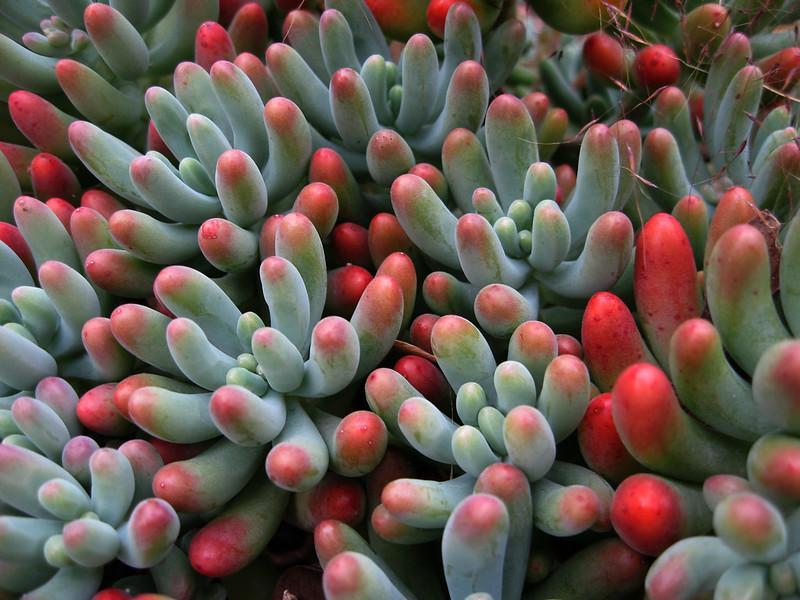
Photo Credit Because of its fuss-free nature and looks, it is one of the most popular of its clan to come indoors.
Quick Plant Information
| Plant Type | Perennial |
| Ideal USDA Zones | 9-11 |
| Season Of Interest | Year-round |
| Growth Rate | Fast |
| Mature Height | 6-8 inches (15-20 cm) |
| Mature Spread | 12-24 inches (30-60 cm) |
| Pruning Needs | Minimal; pinch back stem tips to encourage bushiness |
| Toxic? | Non-toxic |
| Landscape Use | Groundcover, hanging basket plant, container plant |
| Methods Of Propagation | Stem cuttings, leaf cuttings, division |
Plant Overview
Jelly bean plants are evergreen, low-growing succulents that look beautiful in succulent arrangements or even when grown alone on their own. Their sprawling growth habit allows them to be used as ground cover. However, they also make excellent potted plants.
It can withstand drought and challenging weather conditions and thrives when exposed to lots of sunlight. Many succulent lovers include it in their collection as it tolerates almost any growing environment and soil type as long as it gets good drainage.
Where To Buy?
2″ Sedum Blue Jelly Bean Succulent Plant
13. Paddle Plant (Kalanchoe luciae)
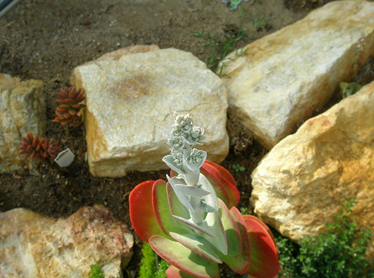
Photo Credit A unique flowering succulent with spoon-shaped green leaves with a hint of red blushing.
Quick Plant Information
| Plant Type | Perennial |
| Ideal USDA Zones | 9-11 |
| Season Of Interest | Year-round |
| Growth Rate | Slow |
| Mature Height | 1-2 ft (30-60 cm) |
| Mature Spread | 1-2 ft (30-60 cm) |
| Pruning Needs | Minimal; remove dead or damaged leaves |
| Toxic? | Toxic to pets and humans if ingested |
| Landscape Use | Houseplant, container plant |
| Methods Of Propagation | Stem cuttings |
Plant Overview
Also known as the flapjack plant, this succulent has thick, rounded, paddle-shaped leaves, frequently taking on a reddish tint during the winter. It adds bold color, texture, and form to a succulent mixed garden. However, you can also plant it as a specimen or tabletop plant.
Furthermore, it requires little maintenance and can be grown outside under the right conditions. Also, the brighter the light conditions, the more pronounced the red leaf edges will be. Otherwise, the plant will stay green when placed in the dark.
Where To Buy?
Kalanchoe luciae / Flapjack / Paddle plant
14. Red Pagoda (Crassula capitella)

Photo Credit A unique succulent with upright stems full of red/green leaves and an easy-to-grow nature.
Quick Plant Information
| Plant Type | Perennial |
| Ideal USDA Zones | 9-11 |
| Season Of Interest | Year-round |
| Growth Rate | Moderate |
| Mature Height | 6-12 inches (15-30 cm) |
| Mature Spread | 6-12 inches (15-30 cm) |
| Pruning Needs | Minimal; pinch back stem tips to encourage bushiness |
| Toxic? | Non-toxic |
| Landscape Use | Groundcover, rock gardens, container plant |
| Methods Of Propagation | Stem cuttings |
Plant Overview
For sheer architectural interest, this extraordinary succulent elicits images of a trip to Shanghai, exciting any succulent collector. It is an easy-to-grow plant that works great as a stand-alone specimen, or you can just use it to add a punch to your succulent collection.
However, how bright and colorful it looks depends on how much sunlight it gets. Its leaves are deep green in the dark but turn reddish in the sun, giving the red pagoda its name.
Where To Buy?
Crassula capitella ‘Red Pagoda’
RELATED: 11 Outdoor Foliage Plants To Arrange Your Garden Like A Professional Landscape Designer
15. Red Gold Aglaonema (Aglaonema’ Red Gold’ Thai Hybrid)
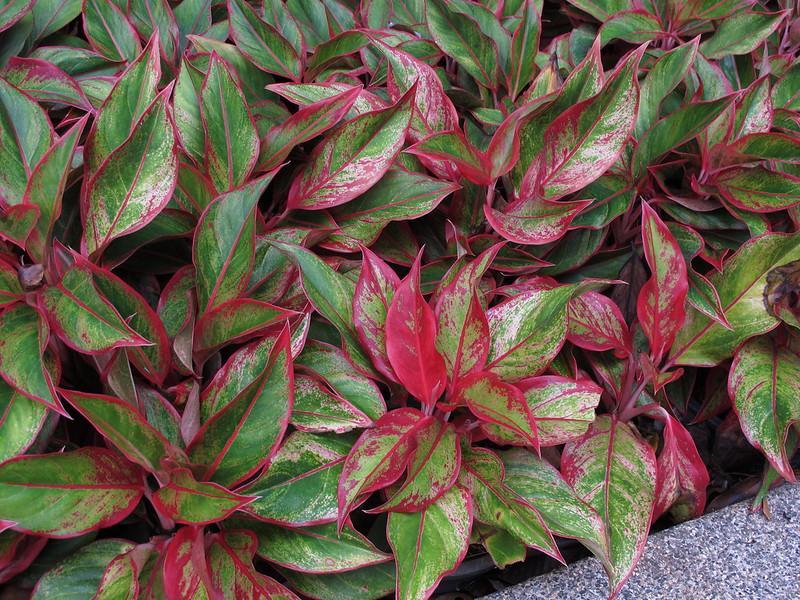
Photo Credit Red Gold Aglaonema is a dynamic and bright plant with strikingly patterned leaves.
Quick Plant Information
| Plant Type | Perennial |
| Ideal USDA Zones | 10-11 |
| Season Of Interest | Year-round |
| Growth Rate | Moderate |
| Mature Height | 2-3 ft (60-90 cm) |
| Mature Spread | 2-3 ft (60-90 cm) |
| Pruning Needs | Minimal; remove any yellowing or damaged leaves |
| Toxic? | Toxic to pets and humans if ingested |
| Landscape Use | Houseplant, office plant, interior landscaping |
| Methods Of Propagation | Stem cuttings, division |
Plant Overview
Red Gold Aglaonema is one of the best indoor plants you can grow for its vivid red and glossy green foliage. It will add color and tropical accents to any interior décor; even better, it is easy to care for. And besides, these indoor plants will increase the humidity, thus reducing respiratory illnesses. All in all, if your space needs a little splash of color Red Gold Aglaonema is for you. It is beginner friendly and fun to keep around.
Where To Buy?
Aglaonema Red gold Starter Plant
16. Lipstick Echeveria (Echeveria agavoides)
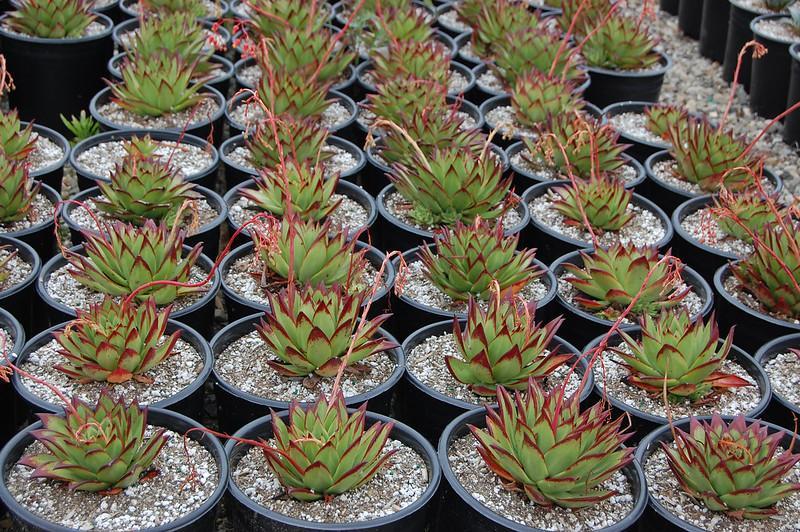
Photo Credit Lipstick echeveria is a unique stemless plant with a star-shaped rosette of thick leaves.
Quick Plant Information
| Plant Type | Perennial |
| Ideal USDA Zones | 9-11 |
| Season Of Interest | Year-round |
| Growth Rate | Slow |
| Mature Height | 6-8 inches (15-20 cm) |
| Mature Spread | 6-8 inches (15-20 cm) |
| Pruning Needs | Minimal; remove any dead or damaged leaves |
| Toxic? | Non-toxic |
| Landscape Use | Rock gardens, container plants, succulent gardens |
| Methods Of Propagation | Leaf cuttings or stem cuttings |
Plant Overview
Lipstick Echeveria has lime green leaves have red edges, giving it the nickname “Lipstick.” It shows off when it has been happily “stressed.” The radiance of its red hue boosts with exposure to the sun. However, you can also place it inside as a green succulent.
The plant also produces small, star-shaped flowers on tall stalks in the summer. Also, you don’t even need a green thumb to grow it – all it needs is a sunny windowsill, and you are good to go. It reigns supreme as a bold and vivid plant, flaunting its leaves.
Where To Buy?
Echeveria agavoides “Lipstick Echeveria” Full 6-inch pots
17. Salsa Rex Begonia (Begonia Rex ‘Salsa’)
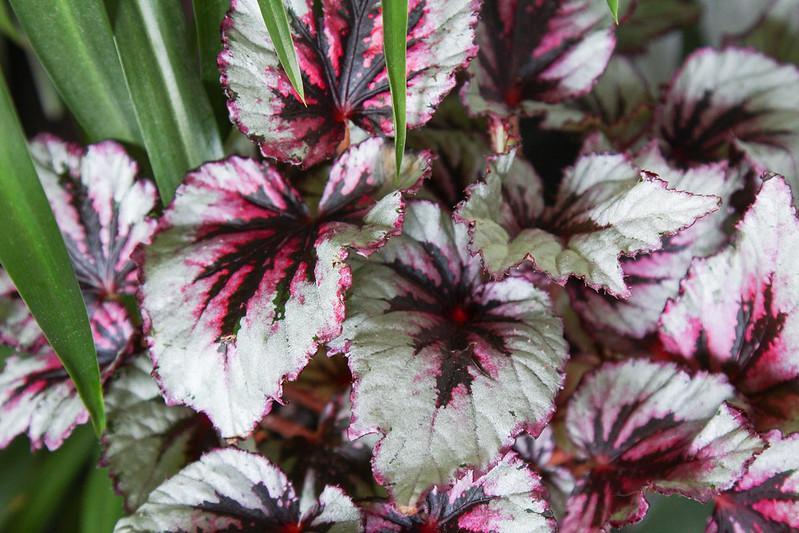
Photo Credit Salsa Rex Begonia has some of the most vibrant colors and showy foliage of all begonias.
Quick Plant Information
| Plant Type | Perennial |
| Ideal USDA Zones | 10-11 |
| Season Of Interest | Year-round |
| Growth Rate | Moderate |
| Mature Height | 1-2 ft (30-60 cm) |
| Mature Spread | 1-2 ft (30-60 cm) |
| Pruning Needs | Regular pinching to encourage bushiness |
| Toxic? | Toxic to pets and humans if ingested |
| Landscape Use | Houseplant, indoor plant, terrarium plant |
| Methods Of Propagation | Stem cuttings, leaf cuttings, division |
Plant Overview
Salsa Begonia rex is known for its variegated leaves, and they are grown almost exclusively for their red and green leaves. They do flower. However, their blooms tend to be miniature, and many gardeners pinch off the flowers to maintain their stunning leaf displays.
Furthermore, these plants are good-natured and as easy to care for as they are easy on the eyes. Their main quibble with modern homes is dry air, so ensure you give them plenty of moisture. Use a humidifier if you need to; however, do not overwater.
Where To Buy?
LIVE Begonia plant Pink Rex Begonia “Salsa” Rex begonia plant
18. Red Heart Philodendron (Philodendron ‘Red Heart’)
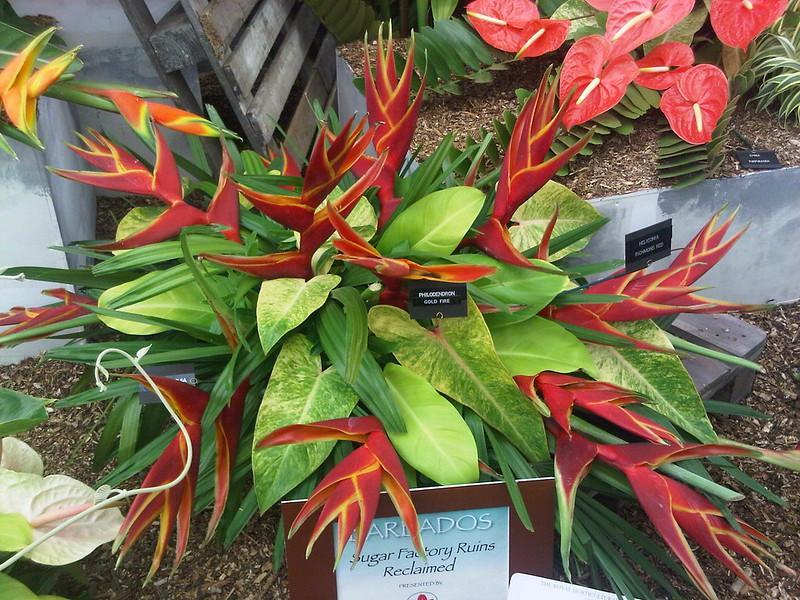
Photo Credit Red Heart is a hardy plant, hard to kill, and even if you try, it will be pretty challenging.
Quick Plant Information
| Plant Type | Perennial |
| Ideal USDA Zones | 9-11 |
| Season Of Interest | Year-round |
| Growth Rate | Moderate |
| Mature Height | 2-3 ft (60-90 cm) |
| Mature Spread | 1-2 ft (30-60 cm) |
| Pruning Needs | Minimal; remove any yellowing or damaged leaves |
| Toxic? | Toxic to pets and humans if ingested. |
| Landscape Use | Houseplant, indoor plant, office plant |
| Methods Of Propagation | Stem cuttings, division |
Plant Overview
Philodendron Red Heart is an unusual plant that produces heart-shaped leaves with red streaks in the middle. However, there is something you should know about it. It is regarded as the “heartbreaker” in the plant community since it is extremely hard to find.
Also, it is very delicate, and most people will get dead plants or plants that have started to rot by the time they arrive. Nevertheless, getting it shipped safely and growing it will brighten your indoor space and be a regular conversation starter.
Where To Buy?
Philodendron Red Heart. No shipping: ca, az, tx, la
19. Poinsettia (Euphorbia pulcherrima)
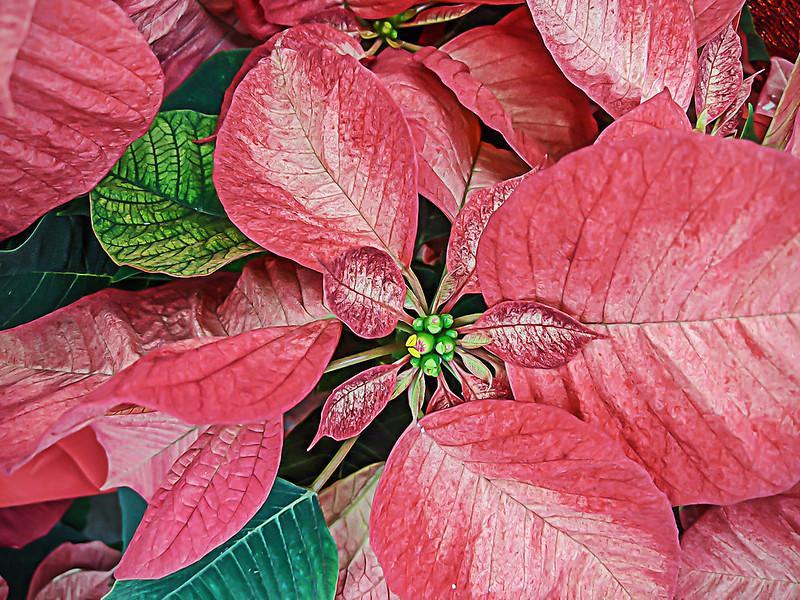
Photo Credit With its beautiful red and dramatic green leaves, the poinsettia is a favorite of the festive season.
Quick Plant Information
| Plant Type | Perennial |
| Ideal USDA Zones | 9-11 |
| Season Of Interest | Winter holiday season |
| Growth Rate | Moderate |
| Mature Height | 2-16 ft (60 cm – 4.8 m), depending on the variety |
| Mature Spread | 2-16 ft (60 cm – 4.8 m), depending on the variety |
| Pruning Needs | Pinch back stems in early summer for bushier growth |
| Toxic? | Mildly toxic to pets and humans if ingested. |
| Landscape Use | Houseplant, holiday decoration, cut flower |
| Methods Of Propagation | Stem cuttings, air layering, seeds |
Plant Overview
Native to Mexico, poinsettias are a popular holiday plant because of their colorful leaves. They make attractive green plants throughout the year. However, they are commonly used for decorating during the winter holidays. The large colorful bracts of the poinsettia are often mistaken for flower petals. However, its flowers are pretty tiny and unshowy.
Place them in full sunlight for best results — like in a sunny window to the east or west.
Where To Buy?
Wild Poinsettia Fireplant Euphorbia cyathophora 20 Seeds
20. Anthurium (Anthurium andraeanum)
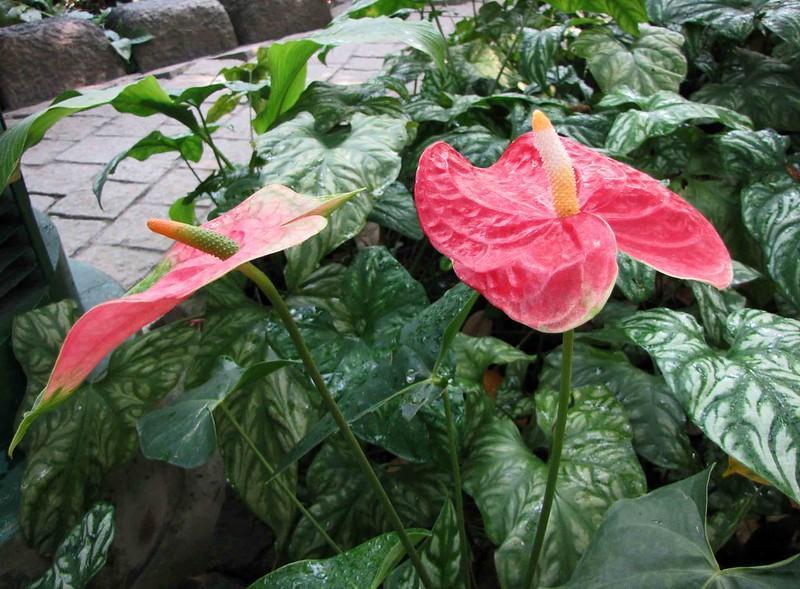
Photo Credit Anthurium is an exotic-looking indoor plant with a red flower and large, glossy leaves.
Quick Plant Information
| Plant Type | Perennial |
| Ideal USDA Zones | 10-12 |
| Season Of Interest | Year-round |
| Growth Rate | Moderate to fast |
| Mature Height | 1-2 ft (30-60 cm) |
| Mature Spread | 1-2 ft (30-60 cm) |
| Pruning Needs | Prune spent blooms and yellowing leaves |
| Toxic? | Toxic to pets and humans if ingested. |
| Landscape Use | Houseplant, indoor plant, office plant, cut flower |
| Methods Of Propagation | Stem cuttings, division, seed |
Plant Overview
Anthurium plants are hardy, and you can find them in many colors, including pink, red, and green. Many gardeners grow them for their stunning foliage. However, be careful if you decide to plant them, as they can be fussy. They need certain care conditions to thrive.
In other words, they are not beginners friendly, and it might take a few tries before you can get it going. However, trust me when I say this, the effort is well worth it. Anthurium plants are classic and handsome indoor plants, especially when presented as gifts.
Where To Buy?
6″ Anthurium, Anthurium andraeanum, Flamingo Flower
The Bottom Line
There you have it! A comprehensive list of some of the best indoor plants with red and green leaves. And with such diversity, whether you have a hot, dry, bright shadowy, cool, warm, or humid home, you will have no difficulty finding the perfect plant for your needs.
Frequently Asked Questions (FAQs)
What is the name of the plant with green and red leaves?
Many plants have green and red leaves, so it isn’t easy to give a specific answer. Nevertheless, some common plants with green and red leaves include croton, coleus, caladium, anthuriums, and some varieties of peperomia and dracaena.
What plant has red stems and green and red leaves?
There are several plants with red stems and green and red leaves. However, a common one is the Red-Edge Peperomia (Peperomia clusiifolia). It has deep red stems and fleshy, succulent-like leaves with deep green color with a red border or edge.
What plant has red and green edges?
There are many plants with red and green edges. For example, the Red-Edged Dracaena and the Red-Edged Peperomia. The Red-Edged Dracaena is often grown as a houseplant, while the Red-Edged Peperomia is often grown in containers or as a ground cover.
What is a 5-leaf plant with red leaves?
There are a few possibilities if you specifically want a plant with five red and green leaves. One is the Japanese Maple, a famous tree with five-pointed leaves ranging from green to deep red. Another possibility is the Red Chokeberry with five-lobed leaves.
What plant has green and red curly leaves?
One plant that has green and red curly leaves is the Red Giant Mustard. Its leaves are usually a deep red or purple at the base and transition to green toward the top. The leaves are also deeply lobed and curly, making them frilly.
Sources for Further Reading
Green Leaves Often Start and End As Red Leaves. (2023). Retrieved 24 March 2023, from https://www.hsu.edu/pages/academics/ellis-college-of-arts-and-sciences/biological-sciences/arkansas-nature-trivia/green-leaves-often-start-and-end-as-red-leaves/
Caladiums – The University of Florida, Institute of Food and Agricultural Sciences. (2023). Retrieved 24 March 2023, from https://gardeningsolutions.ifas.ufl.edu/plants/ornamentals/caladiums.html
Four Benefits of Houseplants. (2023). Retrieved 24 March 2023, from https://extension.sdstate.edu/four-benefits-houseplants
What are your favorite house plants with red and green leaves? Comment below. Also, check out our other articles:
23 Beautiful Plants That Grow In Water Indoors | No Soil, No Fuss
Top 20 Indoor Purple Plants With Pictures And Easy Care Guide
Peace Lily Flowering Stages: Everything You Need To Know and More




